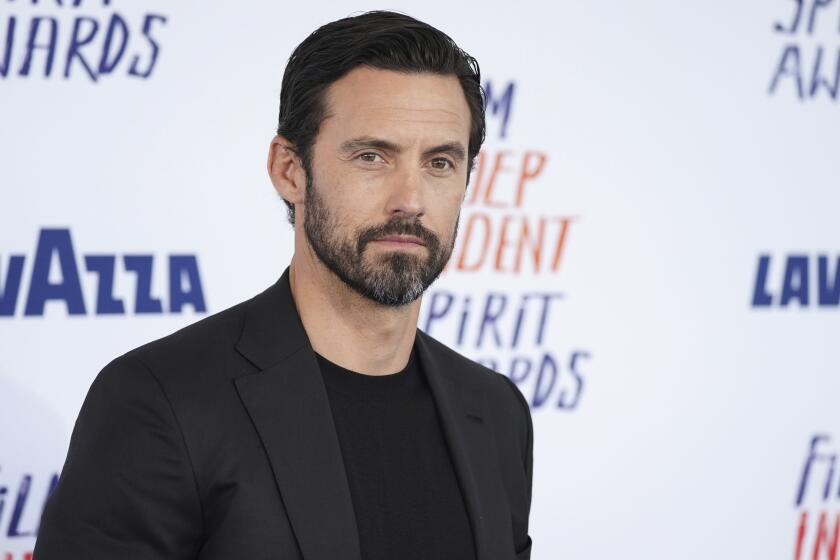MOVIE REVIEW : ‘SPRING’ A FRAGMENTED LOOK AT MUSICAL LOVERS
- Share via
It’s to the credit of “Spring Symphony” (at Laemmle’s Music Hall) that by the end, you’ve become fascinated by its subject matter. You want to know more about Robert and Clara Schumann, and the outcome of their tumultuous courtship.
Peter Schamoni’s film is a serious look at this legendary love affair: the pursuit by Schumann--then a brilliant, largely unrecognized German composer--of the teen-age piano prodigy, Clara Wieck, daughter of the man who had been his teacher and friend but who now obsessively blocked their marriage. It’s a rich subject, and Schamoni tries to plumb the characters’ Freudian depths and evoke the lushness of the era (the mid-19th Century) with a kind of sub-”Amadeus” splendor.
A tall order, and one he doesn’t quite fill. The film impresses you musically and dramatically, but it’s done with a nervous, skittering rapidity. Schamoni paces the film like a melodrama--racing from scene to scene, keeping the camera at off angles and on the move, rarely lingering.
We always hear the music in scraps and fragments--and though it’s often beautifully played and sung (by Gidon Kremer as Paganini, the Staatskapelle Dresden, Dietrich Fischer-Dieskau and Wilhelm Kempf), you rarely have space to enjoy it. Schamoni doesn’t use the music the way Ken Russell does (to underscore and comment on the composer’s life), or with the austerity of Straub in “The Chronicle of Anna Magdalena Bach” or the wit and high style of Forman in “Amadeus.” Instead, we get it on the fly--and we tend to get as frustrated as the lovers.
The core of “Spring Symphony” seems to lie with neither Robert nor Clara, but with the man between them--and Rolf Hoppe, as Clara’s father, gives the movie’s best performance. After the suave brutishness of his Goering surrogate in “Mephisto,” this is a more pathetic monster: an aesthetic disciplinarian, a limpid-eyed tyrant, covertly in love with his daughter and determined to marry her above her class (and not to a musician like himself). This Wieck seems more passionate about Clara (Nastassja Kinski) than does her future husband (Herbert Gronemeyer).
This may be a matter of iconography: Gronemeyer, a pop composer and singer, looks slightly like Schumann, but more confident and muscular. You can see him picking up groupies more easily than pining for Clara, and he rarely suggests the extreme sensitivity and eventual madness that would claim Schumann at 46 (perhaps, it’s believed, from syphilis).
As Clara, Kinski may be a matter of taste; this reviewer has a schoolboy crush on the gorgeous actress and is grateful for any chance to watch her. Her Clara may suffer from the same idealization as Gronemeyer’s Schumann--but it still seems an estimable, brave performance. She has the nubility and fire, if not the virtuoso’s balance, and at the piano, her mime is concentrated, her fingers furious. Again, when the music is cut short, you feel cheated.
The movie closes with a re-creation of one of the most dramatic of all musical premieres: Mendelssohn conducting Schumann’s “Spring” Symphony (inspired by Clara), and Clara making a successful reemergence, playing works by her husband. Yet Schamoni chooses not to emphasize the triumph both Schumanns must surely have felt, but intimations of some unspecified schism (here, it seems less from the impending tragedy than, perhaps, career quarrels). The scene crystallizes the way “Spring Symphony” frustrates you--not because it’s shallow or empty, but because it’s so rich with potential that you’re continually left wanting more: more passion, more music.
‘SPRING SYMPHONY’
A Greentree release of an Allianz Film Produktion film. Producer Peter Schamoni. Director Schamoni. Script Schamoni. Camera Gerard Vandenberg. Editor Elfie Tillack. Art direction Alfred Hirschmeier. With Nastassja Kinski, Herbert Gronemeyer, Rolf Hoppe, Bernhard Wicki, Andre Keller.
Running time: 1 hour, 45 minutes.
MPAA rating: PG-13 (parents are strongly cautioned; some material may be inappropriate for children under 13).
More to Read
The biggest entertainment stories
Get our big stories about Hollywood, film, television, music, arts, culture and more right in your inbox as soon as they publish.
You may occasionally receive promotional content from the Los Angeles Times.










